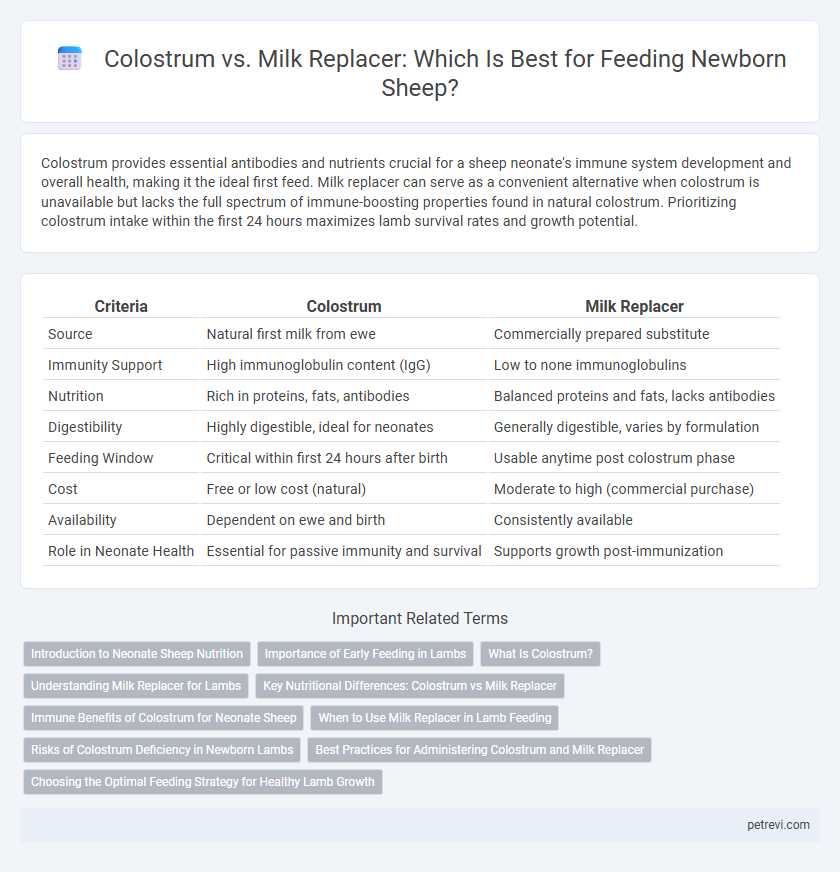Colostrum provides essential antibodies and nutrients crucial for a sheep neonate's immune system development and overall health, making it the ideal first feed. Milk replacer can serve as a convenient alternative when colostrum is unavailable but lacks the full spectrum of immune-boosting properties found in natural colostrum. Prioritizing colostrum intake within the first 24 hours maximizes lamb survival rates and growth potential.
Table of Comparison
| Criteria | Colostrum | Milk Replacer |
|---|---|---|
| Source | Natural first milk from ewe | Commercially prepared substitute |
| Immunity Support | High immunoglobulin content (IgG) | Low to none immunoglobulins |
| Nutrition | Rich in proteins, fats, antibodies | Balanced proteins and fats, lacks antibodies |
| Digestibility | Highly digestible, ideal for neonates | Generally digestible, varies by formulation |
| Feeding Window | Critical within first 24 hours after birth | Usable anytime post colostrum phase |
| Cost | Free or low cost (natural) | Moderate to high (commercial purchase) |
| Availability | Dependent on ewe and birth | Consistently available |
| Role in Neonate Health | Essential for passive immunity and survival | Supports growth post-immunization |
Introduction to Neonate Sheep Nutrition
Colostrum provides essential antibodies, nutrients, and immune support critical for the health and survival of neonate sheep in the first 24 hours after birth. Milk replacers serve as an alternative when natural colostrum is unavailable, yet they often lack the full spectrum of immunoglobulins and bioactive compounds necessary for optimal immune development. Proper early nutrition with colostrum significantly reduces morbidity and mortality in lambs by establishing passive immunity and supporting growth.
Importance of Early Feeding in Lambs
Colostrum provides essential antibodies and nutrients crucial for the immune system development and survival of newborn lambs within the first 24 hours. Milk replacers serve as a valuable alternative when colostrum is unavailable but lack the full immunological benefits required for optimal early immunity. Timely feeding of colostrum significantly reduces lamb mortality and promotes stronger growth compared to milk replacer alone.
What Is Colostrum?
Colostrum is the first form of milk produced by ewes immediately after lambing, rich in antibodies, essential nutrients, and growth factors crucial for the immune protection and development of neonatal sheep. This nutrient-dense fluid contains high concentrations of immunoglobulins, vitamins, and proteins that support the lamb's resistance to diseases and promote healthy growth. Its quality and timely intake are critical for the survival and long-term health of lambs before transitioning to regular milk or milk replacer.
Understanding Milk Replacer for Lambs
Milk replacer for lambs offers a controlled nutrient profile designed to meet the specific growth and immune needs of neonatal sheep, providing a reliable alternative when maternal colostrum is unavailable or insufficient. Formulated with high-quality proteins, fats, vitamins, and minerals, milk replacers support optimal weight gain and health during early development. Proper preparation and feeding techniques are essential to maximize absorption and mimic the benefits of natural colostrum, ensuring strong immune defense and vitality in lambs.
Key Nutritional Differences: Colostrum vs Milk Replacer
Colostrum provides sheep neonates with essential immunoglobulins, antibodies, and high levels of fat and protein critical for passive immunity and early growth, which milk replacers often lack or cannot replicate entirely. Milk replacers primarily offer a balanced mix of proteins, fats, and carbohydrates but typically do not contain the vital bioactive compounds and immune factors present in colostrum, making colostrum irreplaceable in the first 24 hours after birth. The nutrient density and immunological benefits of natural colostrum ensure better survival rates and health outcomes in lambs compared to milk replacers alone.
Immune Benefits of Colostrum for Neonate Sheep
Colostrum provides essential immunoglobulins and bioactive compounds crucial for developing the immune system of neonate sheep, offering superior protection against infections compared to milk replacers. It contains high levels of antibodies such as IgG, IgA, and IgM that enhance passive immunity and reduce mortality rates in lambs. Unlike milk replacers, colostrum also supplies growth factors and cells that stimulate gut development and strengthen neonatal immune responses.
When to Use Milk Replacer in Lamb Feeding
Milk replacer is essential for lambs deprived of ewe colostrum within the first 24 hours after birth, ensuring critical nutrient and antibody intake for immune defense. It is recommended when ewes have insufficient colostrum production or lambs are orphaned or rejected, providing necessary proteins, vitamins, and energy. Properly formulated milk replacers mimic ewe's milk composition and support healthy growth, especially during the vulnerable neonatal period.
Risks of Colostrum Deficiency in Newborn Lambs
Colostrum deficiency in newborn lambs significantly increases the risk of hypothermia, weakened immunity, and higher mortality rates during the critical first 48 hours. Insufficient intake of maternal antibodies from colostrum leaves lambs vulnerable to infections such as pneumonia and septicemia. Prompt administration of a quality milk replacer can only partially mitigate these risks, underscoring the necessity of ensuring adequate colostrum consumption immediately after birth.
Best Practices for Administering Colostrum and Milk Replacer
Administering colostrum within the first two hours after birth is critical for lambs to acquire essential immunoglobulins that protect against infections. When natural colostrum is unavailable, a quality milk replacer formulated specifically for sheep ensures adequate nutrition and hydration, but it should be supplemented with colostrum replacer products to mimic immunity benefits. Best practices include maintaining proper hygiene during feeding, using precise dosages based on lamb weight, and monitoring lambs closely for signs of successful intake and digestion.
Choosing the Optimal Feeding Strategy for Healthy Lamb Growth
Colostrum is rich in immunoglobulins, essential vitamins, and nutrients that provide passive immunity to newborn lambs, significantly reducing mortality rates. Milk replacers offer a convenient, standardized alternative when maternal colostrum is unavailable but often lack the bioactive compounds critical for optimal immune development. Prioritizing early colostrum intake within the first 24 hours, followed by high-quality milk replacer if necessary, supports healthy lamb growth and immune system maturation.
Colostrum vs Milk Replacer for Sheep Neonate Feed Infographic

 petrevi.com
petrevi.com